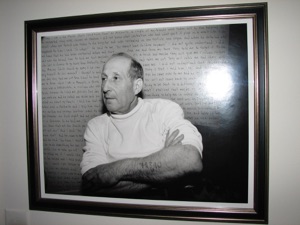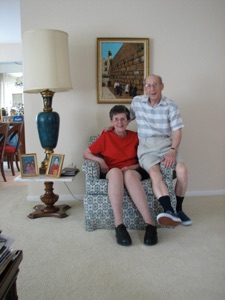From Friday 30 June thru Sunday 2 July 2006, Cilwia Strauss visited Eil Oliff, a Żuromin Holocaust survivor who lives in Skokie, Illinois. Cilwia, a descendant of the Przhechacki family, has graciously agreed to share her story of the visit here.
**********
We arrived at Skokie in the late afternoon. Due to construction and heavy traffic it took Bob and me 7 hours from Hastings, MI to Skokie, IL (usually it takes 3 ½ hrs). We went straight to the Hotel, that Sylvia and her husband Karl had made reservations for ahead of time. We actually met Sylvia and Karl at the hotel while they were on their way out to visit Eli and his wife Bernice. Sylvia and Karl had also been held up in the heavy traffic in Chicago. It took them 9 hrs. from Ashland, Ohio to Skokie. So we quickly checked in at the hotel and joined Sylvia and Karl. Meanwhile it was ca. 17:00.
Eli and Bernice had already been expecting us since 14:00, because we had told them, that we would be at their place at 14:00 hrs. Eli was very excited about meeting us - and so were we. He had told us earlier, that he had a surprise for us. We told him, that we also have things, which we wanted to show him (Sylvia had brought pictures along and I had put together a folder about my research).
Eli’s surprise was an approx. 2 hours video. He explained to us, that 11 years ago (in 1995) the moviemaker Steven Spielberg had founded the following: USC Shoah Foundation Institute for Visual History and Education ( HYPERLINK "http://www.usc.edu/schools/college/vhi/" http://www.usc.edu/schools/college/vhi/).
Eli mentioned to us, that after the Holocaust, he had responded to questions when asked, but never before had he talked about his ordeal from it’s beginning until his liberation until the Spielberg people interviewed him.
Before we watched the video, Bernice suggested, that we should all eat supper first. Bernice lit the Shabbat candles and Eli made the Kiddush over the wine. Then we started supper. Bernice had fixed a delicious meal. Afterwards Eli invited us to watch the aforementioned video. As a time witness of the Shoah he began talking about his life in Żuromin when he was still a young child and how he was raised. The following is my own summery of all the events mentioned in the video:
At the age of 3 his religious education started – in other words he received a religious education long before he was put into the state’s school system. When Hitler invaded Poland in 1939, the Germans quickly occupied the town of Żuromin. They ran all the Jews out of Żuromin. The Jews had to live in Ghetto’s in other cities near Żuromin. Eli’s parents and his other brother and sister went to Warschau, but conditions became unbearable there.
Eli’s father had been a soldier in the Polish Army during WWI. The money he had made during that time had never been spent by his parents. Those coins were saved for „bad days“. Shortly before Eli’s family was forced out of Żuromin and into their first Ghetto by the Nazis, his mother had exchanged the silver coins into bills. Then she had taken Eli to the shoemaker in Żuromin, were she told the shoemaker to make a special compartment in Eli’s boots, where she later hid the money. (How wise of her!) Some time later the situation in the Ghetto got very bad. When Eli’s father realized that he had no more money left to buy food, he told his wife about it. That’s when Eli’s mother took the money out of Eli’s boots and gave it to Eli’s dad. But even this money did not last forever. Eli’s Dad worked outside the Ghetto. One day, Eli was told by his mother, that he, too, had to go to work. Not only was he still very young, but he also looked young, so his mother stuffed paper into his boots, so that Eli would look taller and older. The next day he walked with his father to work. Even so the people, who assigned work to them, did not quite believe, that Eli was of working age. But at that time it did not matter very much anyhow. Eli started sweeping streets etc. After work everybody was marched back into the Ghetto. During those marches back, Eli usually ran away and tried to buy some food for the family with the little money, he had made. Since Eli was very small, nobody usually noticed his temporary disappearance, because he always made it back, before they entered the Ghetto. But one day a German soldier caught him. He shot at him. The bullet entered his upper leg. He was taken back into the Ghetto, where he was put into the Ghetto’s hospital. With very few medical supplies they operated on his leg, but it did not look good. The doctors mentioned to Eli’s mother that they probably would have to amputate his leg. Their was one Jewish doctor, who used to be a well known surgeon in Poland before the Shoah, who tried one more operation on Eli’s leg, which was successful. He actually saved Eli’s leg from amputation. But it took weeks to heal. (Eli showed us the scar, which is still very visible today.)
One day Eli’s parents decided to leave the Warschaw Ghetto, since the situation became unbearable there. At first Eli and his father escaped, later his mother and the others followed. Eli told us about this escape. He said, that his father and him had jumped over the wall at the old Jewish Cemetery. They went to the Ghetto in Mlawa, were the PrŻechacki Family were staying.
When they arrived at the Ghetto, there was no more living space for Eli’s family. Eli said, that the PrŻechacki’s (our Grandparents) told his parents, that they could stay in a shed, which belonged to their apartment. Eli said, that the PrŻechacki’s had saved his family, because they would not have lasted very long without a place to stay.
But then came the time when all the people of the Mlawa Ghetto were deported. Eli and his family were deported to AuschwitŻ in 1942, were they were separated.
<When I searched the Central Database of Yad Vashem ( HYPERLINK "http://www.yadvashem.org" www.yadvashem.org ) about our PrŻechacki Family I found many records of testimony, most of them given by Elimelekh Shklar and by Żalman PrŻechadŻki. Żalman was a cousin of our fathers since Żalman’s father Baruch and our Grandfather Moses had been brothers. So according to Żalman, our Grandparents as well as their daughters (our Aunts Mirle and Kayjla) and Uncle Isaak’s wife Rivka and her 2 boys (Akiba and ???) had either been killed in Treblinka or their souls had perished without us knowing where during the Shoah.>
In AuschwitŻ Eli was sent to the “Maurerschule = bricklaying school”. Eli together with other young men were taught this trade, so they could built more barracks = Blocks, for more prisoners. While he was attending school, a couple of his friends were taken out of school and sent straight to the hospital, to be castrated. They were chosen at random. Eli did not yet know what castration was and what part it played in a man’s life. Eli recalled, when one of his friends was taken to the hospital and was castrated on one testical and when he explained to him in detail, what had happened to him, Eli still did not understand the effect it would have on this young man’s life if he would survive. Eli also did not know, that this young man had already been castrated once before. He told Eli, that he should try everything to get away from the Maurerschule.
One day Eli was taken to his father, who was laying on his bunk in another Block. They had worked him to death. He wanted to see him again, before it was too late. With his last breath he told Eli: “Remember, that you have a relative in the USA. His name is Joseph Oliff. Do not forget this name. If you survive this, find Joseph and go to the USA. That was the last time, Eli saw his father alive.”
In 1944 Eli was taken out of the Maurerschule and put to work in Buna. The Kapo there was a Volksdeutscher (a German-Polish civilian). He called Eli aside and asked him about his family. Eli told him that his father had been worked to death in Ausschwitz, his mother and younger brother had been sent to the gas chambers the first night of their arrival, and that his sister was still alive in Birkenau. This particular Kapo was known for his brutality and his sadism. Eli had seen with his very own eyes, how this Kapo had beaten people to death with his wooden stick, which he carried with him all the time, by breaking every bone in the victim’s body or by cracking their skulls. This Kapo had told Eli, that he would like to do something for him and that he would like to take him out of this the concentration camp.
In the evening, when Eli was back in his Block, he told the 3 Przechacki brothers (Isaak, HersŻ and Schlomo) everything and asked them, what they thought about the Kapo’s offer. Eli trusted them, because they were from the same town, their parents had known each other for as long as he could think, and the 3 brothers were older and more matured than him. Right away, the Przechacki’s said that this is probably a trick and that he should not trust this Kapo. That perhaps the Kapo would give him civilian clothing and than have him taken out, so that the others could catch him in order to hang him later on or beat him to death or to shoot him. So Eli did not take the Kapo’s offer. (And he told Sylvia and me, that this advise had saved his life, because he was still so young and he did not understand a lot about life. Eli said, that this was the 2nd time, that the PrŻechacki’s had saved his life.)
Eli told the Kapo that he did not want his help. On January 17, 1945 the Kapo came over to Eli and told him, that he did not need to come back to work the next day. On January 18, 1945 Eli was forced onto the death march. They were marched in the snow for miles from Buna to Gliwicz. During the death march, every single prisoner, who lagged behind or fell, was shot. Many people also died of fatigue and illness. In Gliwicz everybody, who had survived the death march so far, was forced into freight cars (=box-cars) with open carriages without food or shelter for days. Eli told us, that when they were put on the box-cars, the Nazis shuffled so many prisoners into one car, that is was impossible to sit down, turn a little, or even stretch. People were dying rapidly in those boxcars. They only had the sky above them and the snow, which fell on them. That was the time, when Eli lost his strength and his will to live. But the 3 Przechacki’s told him, that he had to be strong, that he is young and that he needs to stay alive. When he was completely exhausted, they fed him snow in the boxcar, so he would pull through. He made it to the final train station, from where they were marched again, this time to the concentration camp of Buchenwald. Again Eli told us, that the Przechacki’s had saved his life for the 3rd time, when he was about to give up.
Eli told us that he had written a letter about the Przechacki’s and how this one family had saved his family and later their son’s how they had kept him alive, and that this letter is to be seen at the Holocaust Museum in Washington, D.C.
From Buchenwald the Nazis had put together another death march and Eli, again, had to come along. They marched hundred of prisoners westwards. Out of that large group of prisoners only a very small amount of prisoners survived and Eli was one of them. They were finally liberated by the US-Army. When Eli was liberated, he was more dead than alive. The soldiers offered them food, but Eli was only able to eat little. He said, that so many survivors died after the liberation, because they could not handle the sudden intake of real food.
When Eli was in the Displaced People Camp in Landsberg am Lech, Germany, 3 survivors had found canned food in the nearby village. They had taken it along and in the PD-Camp they had opened it up. Inside was lard. They ate it and later on, they died. It was too much grease for their starved bodies.
While at the DP-Camp, Eli started looking for his relative in the USA. After he had recuperated to some degree, he went back to school in the DP-Camp, since he was so very young and he had not had any school education for so many years. Finally his relative was found and in 1949 Eli immigrated to Illinois, USA. Eli was the only one of his immediate family (appr. 70 people) who had survived. In Illinois his relatives gave him time to get accustomed to a life in the USA, in freedom. Then they sent him to school and at the age of about 22 he finished his High School Degree. The relatives wanted him to go to college, but Eli – knowing how expensive that would had been--refused the offer, instead, he went to work.
Years later he fell in love with Bernice, whose parents had immigrated from Poland before the Shoah. Bernice is the first generation in her family, who was born in the USA. They have two children: a daughter, Basia, and a son, Ira.
Basia is a CPA (Certified Public Accountant), and her husband Joel is a doctor of gastro-enterology. They have 3 children, 2 girls and a boy. Basia is named after Eli’s mother.
Ira is a medical doctor (cancer and hematology) and his wife, Irma, is also a doctor (allergist), They have 4 children, 2 girls and 2 boys
. Ira is named after Eli’s father and grandfather.












